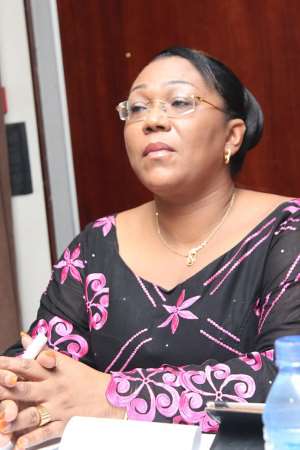
The Ghana AIDS Commission yesterday met editors of media houses under the editors' forum to deliberate on the role the media can play to help sustain public interest and commitment to the HIV response in the country.
The theme for discussion was ''Towards an HIV free generation; the role of the media' 'The meeting afforded the leadership of the commission to keep the media abreast with HIV and AIDS issues and also an opportunity for editors and the commission to dialogue on challenges encountered in writing HIV and AIDS stories, how best to overcome them and find new areas to focus on.
The meeting was highly attended by editors, health reporters, feature editors and writers and social commentators at large. Speaking at the functions, the UNAIDS Ghana country director, Mr Girmay Haile, observed that although Ghana has made progress in reducing the HIV/AIDS prevalence rate to 1.3%,there is the need to sustain efforts at reducing infections so that it will no longer be of major public health problem.
He said success of HIV/AIDS can best be measured when there is 60% reduction of the infection rate in the affected population, high condom use and new born having no infection.
Mr Haile said prevalence is not telling us anything but the need to have a plan to push further so that we have less infection. According to statistics, six(6) regions in Ghana had prevalence rate higher than 1.3% and that is where the reality is, it can easily be turn around and that will be most dangerous.
Members of the commission were unanimous in their call for increased use of condoms to prevent further infections, saying that condom use in Ghana is dangerously low. In Ghana, about 235,982 are estimated to have the infection with 74,000 of them under treatment.
The commissions acting director of technical services Mr Cosmos Ohene Adjei who gave an overview of the national HIV response said if 90% of the infected population were put under treatment between 2015-2020, the epidemic would be over and Ghana would be dealing with HIV/AIDS as no more as major public health issue.
He was however hopeful that with the progress made so far in the country Ghana could be one country that had effectively dealt with the challenges of HIV/AIDS.
Mr ohene Adjei said globally resources from developed countries are reducing. He said Ghana is no exception to this global phenomenon ohene Adjei was however not happy about the rate at which people to play on the issue of stigmatization and exclusion in the society. He stressed on the need to build on the internal and external capacities of service providers.
He said with the resources challenges and the number of infected cases being low, the economy should be able to absorb the treatment of infected cases.
The commission was of the hope that by 2015 Ghana would have become 89% covered with more people living in the cities, noting that it was more complicated dealing with the problems of HIV/AIDS in the cities than in the rural areas. It further said the fight against HIV/AIDS was not a social revolution but an attempt to identify pockets of the population where the risk is very high and endangering the general population, stressing that HIV/AIDS prevalence could be successful in an environment of inclusiveness with the media playing an active role.




 Ejisu by-election: I will be shocked if Aduomi is able to secure 5percent vote —...
Ejisu by-election: I will be shocked if Aduomi is able to secure 5percent vote —...
 University President expresses worry over surge in provocative dressings, indisc...
University President expresses worry over surge in provocative dressings, indisc...
 Avetakpo residents lament disregard shown by Ho West officials, threatening to p...
Avetakpo residents lament disregard shown by Ho West officials, threatening to p...
 New Jakpa palace will be grand symbol of our history and culture — Mahama to Yag...
New Jakpa palace will be grand symbol of our history and culture — Mahama to Yag...
 Prof. Jane Naana has shaken Ghana's political foundation, causing NPP to run hel...
Prof. Jane Naana has shaken Ghana's political foundation, causing NPP to run hel...
 I've been receiving threats after I commended NPP for completing school projects...
I've been receiving threats after I commended NPP for completing school projects...
 Bawumia is ready to debate Mahama any day – Frederick Opare-Ansah
Bawumia is ready to debate Mahama any day – Frederick Opare-Ansah
 Register births at CHPS compounds; don't come to Accra – Birth & Death Registrar...
Register births at CHPS compounds; don't come to Accra – Birth & Death Registrar...
 We never said only 10 BVDs were auctioned – EC replies IMANI
We never said only 10 BVDs were auctioned – EC replies IMANI
 Election 2024: Akufo-Addo willing to trample on Ghana’s constitution – Mahama
Election 2024: Akufo-Addo willing to trample on Ghana’s constitution – Mahama
